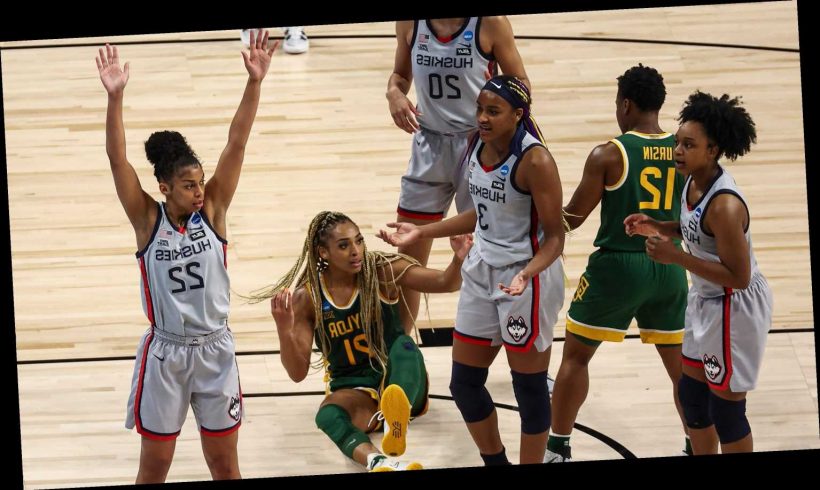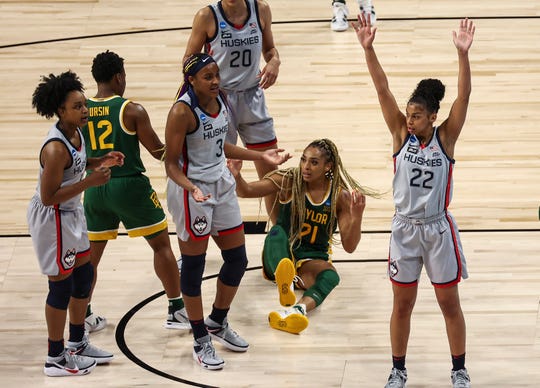SAN ANTONIO — Maybe it was a foul. Maybe it wasn’t. It depends on your vantage point, your perspective and your allegiances, probably.
But then what about all the other calls, some of which went Baylor’s way until the one that didn’t? Sports are imperfect. That’s why they’re such a terrific reflection of humanity. Calls are made, calls are missed, and you are left to live with the outcome, good or bad.
The easy story is that a no-call on DiJonai Carrington’s shot with one second left Monday night cost second-seeded Baylor a trip to the Final Four. That the referees, rather than the players, decided the outcome.
But a 40-minute game never comes down to one play, one call. It’s a multitude of things that all add up to the final result, in this case a 69-67 win for UConn.
There was DiDi Richards’ hamstring injury, which sucked all the momentum out of Baylor when it was up 10 points on top-seeded UConn. There was Paige Bueckers finding that extra gear that special players have, erupting for 10 points in the 19-0 run that swung the momentum in UConn’s favor. There were the free throws Baylor missed down the stretch.
There was even the questionable choice on Baylor’s last possession, a play that was too slow to develop before the call that didn’t come. Carrington had been sublime all night, but it wasn’t a great look, even before Olivia Nelson-Ododa stuck a hand in her face.
Or, some would say, on her face.
“I personally don't see it as a controversial call,” Carrington said. “I've already seen the replay. One girl fouled me in my face and one girl fouled me on my arm. At that point, you can’t do anything else.”
Huskies guard Evina Westbrook (22) and Baylor Lady Bears guard DiJonai Carrington (21) react after a play during the fourth quarter. (Photo: Troy Taormina, USA TODAY Sports)
But, really, would it have been any better to lose in any other fashion? A loss is a loss is a loss and, at this stage, it’s never going to be easy to take.
“I’m not going to sit here and apologize for it,” UConn coach Geno Auriemma said after his team escaped to advance to its 13th consecutive Final Four.
“If people want to talk about that the rest of the week, you're welcome to do that. It's not going to change the outcome. And it's not going to make me feel bad that you say it was a foul.”
The referees had been letting both teams play all night. Stanford coach Tara VanDerveer would say all tournament. You cannot then ask them to make a call in that, most critical of moments.
If there was a travesty, it was that Baylor and UConn were playing now, in the Elite Eight. If anyone got robbed, it was women’s basketball. This wasn’t an Elite Eight game. This was a game worthy of a national championship and, if not that, certainly the Final Four.
Auriemma had said even before the game that Baylor deserved to be a No. 1 seed, and nothing he saw Monday night changed his mind. Bears coach Kim Mulkey said much the same, believing her team to be hurt by the games it couldn’t play because of COVID-19 outbreaks.
(That might have been the only thing Mulkey said about COVID that made sense, but I digress.)
These are two of the best programs in the country, and they had no business playing each other this early.
“This was harder than winning some of the national championship games that we've won, without question. Without question,” Auriemma said. “This game was tougher than a handful of National Championship games or any Final Four game that you want to mention.”
It’s a shame that this game will be remembered for one botched call, rather than the brilliance of Bueckers. But the real shame is that this game was played now, rather than Sunday night.
Follow columnist Nancy Armour on Twitter @nrarmour
Source: Read Full Article

